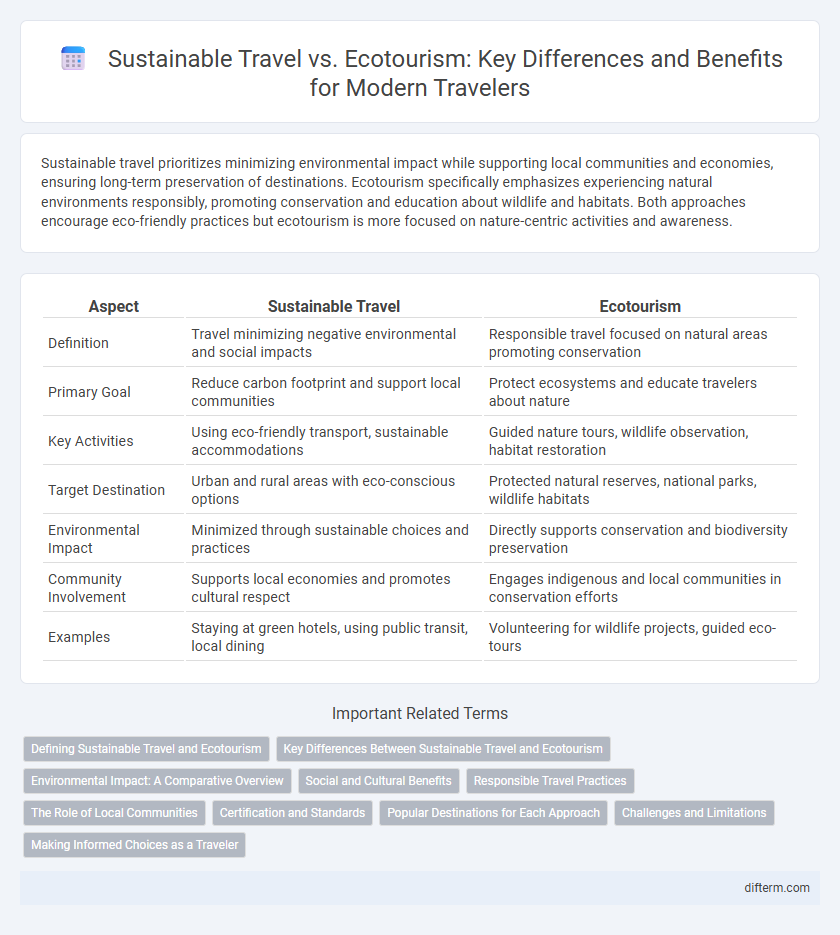Sustainable travel prioritizes minimizing environmental impact while supporting local communities and economies, ensuring long-term preservation of destinations. Ecotourism specifically emphasizes experiencing natural environments responsibly, promoting conservation and education about wildlife and habitats. Both approaches encourage eco-friendly practices but ecotourism is more focused on nature-centric activities and awareness.
Table of Comparison
| Aspect | Sustainable Travel | Ecotourism |
|---|---|---|
| Definition | Travel minimizing negative environmental and social impacts | Responsible travel focused on natural areas promoting conservation |
| Primary Goal | Reduce carbon footprint and support local communities | Protect ecosystems and educate travelers about nature |
| Key Activities | Using eco-friendly transport, sustainable accommodations | Guided nature tours, wildlife observation, habitat restoration |
| Target Destination | Urban and rural areas with eco-conscious options | Protected natural reserves, national parks, wildlife habitats |
| Environmental Impact | Minimized through sustainable choices and practices | Directly supports conservation and biodiversity preservation |
| Community Involvement | Supports local economies and promotes cultural respect | Engages indigenous and local communities in conservation efforts |
| Examples | Staying at green hotels, using public transit, local dining | Volunteering for wildlife projects, guided eco-tours |
Defining Sustainable Travel and Ecotourism
Sustainable travel refers to tourism that minimizes environmental impact, supports local economies, and respects cultural heritage, ensuring long-term preservation of destinations. Ecotourism is a subset of sustainable travel focused specifically on responsible exploration of natural areas, promoting conservation and education about wildlife and ecosystems. Both prioritize reducing carbon footprints and fostering community engagement, but ecotourism emphasizes nature-based experiences and tangible environmental benefits.
Key Differences Between Sustainable Travel and Ecotourism
Sustainable travel emphasizes minimizing environmental impact across all tourism activities by promoting responsible resource use, supporting local economies, and preserving cultural heritage. Ecotourism specifically targets nature-based experiences that educate travelers about conservation while fostering wildlife protection and habitat preservation. Both concepts align in promoting ethical tourism, but ecotourism is a subset focused explicitly on environmental education and natural ecosystem conservation.
Environmental Impact: A Comparative Overview
Sustainable travel minimizes carbon emissions, waste generation, and resource depletion by promoting eco-friendly transportation and responsible accommodation choices. Ecotourism specifically targets the conservation of natural habitats and biodiversity, often involving guided experiences that educate travelers on environmental preservation. Both practices aim to reduce environmental impact, but ecotourism places stronger emphasis on active ecosystem protection and local community involvement.
Social and Cultural Benefits
Sustainable travel fosters authentic engagement with local communities, promoting cultural preservation and economic empowerment through responsible tourism practices. Ecotourism emphasizes environmental education and supports indigenous traditions by encouraging travelers to respect and participate in local customs. Both approaches enhance social cohesion and cultural awareness, creating meaningful experiences that contribute to community resilience and identity.
Responsible Travel Practices
Sustainable travel incorporates responsible travel practices that minimize environmental impact while supporting local communities economically and culturally. Ecotourism specifically emphasizes conservation efforts and educational experiences in natural settings, promoting biodiversity protection and cultural preservation. Both approaches encourage travelers to reduce waste, use eco-friendly accommodations, and respect indigenous traditions to foster long-term sustainability.
The Role of Local Communities
Local communities play a crucial role in sustainable travel by actively participating in decision-making and benefiting economically from tourism activities. Empowering these communities ensures preservation of cultural heritage and natural resources while promoting responsible visitor behavior. Ecotourism specifically supports local livelihoods through conservation efforts and educational experiences, fostering a symbiotic relationship between travelers and host environments.
Certification and Standards
Sustainable travel emphasizes minimizing environmental impact through certifications such as Green Globe and EarthCheck, which set rigorous sustainability standards for accommodations, tours, and transportation. Ecotourism specifically targets conservation and community benefits, often adhering to standards like the Global Ecotourism Network's criteria that promote responsible interaction with natural habitats. Both approaches rely on third-party certification to ensure accountability and measurable environmental and social responsibility in travel experiences.
Popular Destinations for Each Approach
Popular sustainable travel destinations include Copenhagen, Sweden, and New Zealand, known for their extensive green infrastructure and eco-friendly policies. Ecotourism hotspots like Costa Rica's rainforests, the Galapagos Islands, and Borneo offer rich biodiversity and opportunities for wildlife conservation participation. Both approaches prioritize low environmental impact but differ in emphasizing cultural immersion versus nature preservation.
Challenges and Limitations
Sustainable travel faces challenges such as balancing economic growth with environmental protection and ensuring fair benefits for local communities without causing overtourism. Ecotourism's limitations often include inadequate regulation, leading to greenwashing and negative impacts on fragile ecosystems despite intentions to promote conservation. Both approaches struggle with educating travelers on responsible behaviors and implementing effective monitoring to minimize their ecological footprint.
Making Informed Choices as a Traveler
Choosing sustainable travel involves minimizing environmental impact, supporting local economies, and respecting cultural heritage, while ecotourism specifically emphasizes conservation and education in natural settings. Informed travelers evaluate tour operators' certifications, local community benefits, and resource management practices before booking. Making conscious decisions ensures meaningful contributions to destination preservation and authentic cultural experiences.
sustainable travel vs ecotourism Infographic

 difterm.com
difterm.com